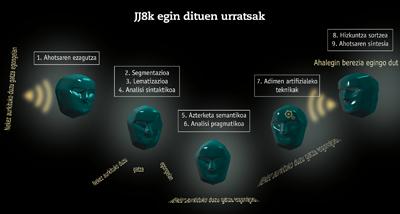JJJJ8 lost in the jungle of the tongue
Robots are machines, they have no ear. To be able to hear it, they need a microphone, digitize that wave of voice, and discover the speaker's message. Engineers and computer scientists have participated in this voice recognition system. The goal is not easy: the machine must understand the message regardless of the tone and diction of the speaker.
For this it is necessary that the machine is formed previously. They are artificial intelligence techniques. You have to learn. It is not strange, the man also learns like this. Children take years to know the words they are told and to catch the message that is given to them with speech. Adults also do the same when they learn a new language. They have to "make ear". And with that spell does not end what must be learned.
The robot JJ8 It is difficult to find salt in the room when you receive the phrase, you have to do many things to understand it. He already knows the succession of five words, but now he must clarify what is the structure of the phrase. It has to be segmented, that is, it has to know that the words form an intelligent set, that the word salt is another, and that the word in the living room is another. And it must clarify why these sets and not others form.
In addition, you must analyze it literally. You should know that it is verb to find, salt, etc. And you must identify the slogans: identify the slogan behind the word find. That is, it has to be the basic form of the words it has received to seek meaning.
Through the human world

For the moment, JJ8 has not understood anything. He knows what words make up the phrase, how they are organized, and where he must go to find the meaning of each word, but he has not understood anything. It has no knowledge or context to understand the phrase. But the next step is to understand what Fausto said. The brother-in-law is about to dive into the world of ambiguity.
Fortunately, these words do not make much sense. Apparently, salt is salt, that is, it does not appear that this word indicates anything other than sodium chloride. But it is not entirely true: it can be synonymous with grace or vitality. In this case, JJ8 should rule out this meaning and clarify that Fausto refers to sodium chloride.
The most effective way that computer scientists have invented to do so is the statistical method. JJJJ8 should look for the salt motto in many texts and analyze with what other words it usually appears. It is a difficult job, which will be explained frequently in laboratory texts, but which does not help him. Clearly, Fausto's message has no relation to chemistry (or at least believes it). However, in most texts accompanying salt and discovery, salt will be synonymous with sodium chloride. Not always. But if so in most cases, you must make a decision -- difficult -- in favor of that acceptance. Today, computer scientists have done a good job for machines to make these kinds of decisions, and yet, statistics are not always the best way to achieve it (it is possible that in some contexts in which words of salt coexist and find the meaning of salt be grace or vitality).
Computer scientists (and linguists) call disambiguation to the work of choosing the correct meaning of each word. The machine is essential to understand a conversation and, in many cases, the main problem to overcome. But it is not the only problem.
To understand Fausto, JJ8 should do a reading at another level. It is difficult to find the true meaning of the phrase You will not find it. However, the gajo JJ8 believes that yes, that hardly the word indicates that it will have to make a special effort.
But the language of man is not clear and direct. It is full of metaphors, irony, hyperbola and other tricks. Many times he uses a phrase to express something that does not mean that phrase. Until then he says that knowing that he will not join with anyone. Do you have hours? Ask yourself what time it is and not to confirm that the other has a clock that works properly. There are many other examples.
Answer: The Answer: Answer

JJJJ8 has understood what it has been able to and responds according to what it has understood. But this process is not easy either. In an interview, answers of all kinds are needed. Sometimes you have to look for a data to answer. Other times a complete explanation. Other times you have to respond to a provocation. There is everything.
And looking for each type implies a strategy of its own. Again we encounter artificial intelligence: answering techniques to questions, intelligent search, information extractions, automatic translation of information in various languages, etc. And, of course, combinations of these techniques are also necessary.
The work of the robot is taking shape. It can be said that looking for the answer has made it the most difficult. But it does not end at all. It should give form of speech to this response. Use linguistic creation techniques. Somehow it is a way back. He has received a voice, analysed the language of what has been said, understood it, sought a response and now has to do the opposite. Apply the language rules to the response and create an appropriate text to speak.
And finally, JJ8 must synthesize the voice to say what is in that text. Maybe it's the easiest thing. The creation of the synthetic voice is largely developed, unless emotions and a very special tone are required.
Finally! The robot responds. In this case, Fausto tells JJ8 to go to the kitchen. Nothing more. The robot needed no response. Back to the kitchen, I had to look there for salt (salero). But he has answered and the truth is that thanks to the answer he knows what Fausto JJ8 has thought.
Fausto is not very happy because the robot cook does not understand him at all, and that forces him to speak in a concrete and clear way. But seeing how difficult it is to create an artificial conversation, Fausto should be satisfied.
Reality reality reality reality
JJ8 is not real. It is born as an example of the difficulties that a machine has to train to speak. But their alternative real robots must overcome similar difficulties depending on their applications. They may not take the same steps as the JJ8 robot or do so in the same order. But, in all cases, the science and technology behind it has to do with language processing. The main difficulties presented by the vending machines of truth are the processing of human language.
The researchers have advanced on this path. However, the experts agree that there is still a lot left for machines to speak as people. The research is only in the first steps, but the work already done is surprising; on the one hand, the collaboration between computer and linguists has shown the difficulties of artificial conversation and, on the other, has begun to develop strategies for most of the steps. It is not little.





